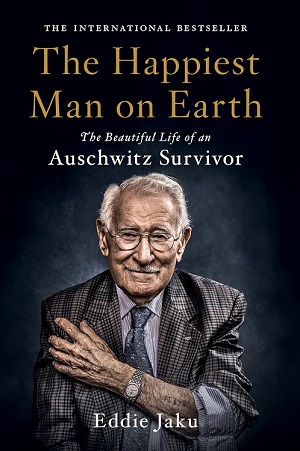The Happiest Man on Earth by Eddie Jaku is a memoir and reflection on his experiences as a Holocaust survivor and the profound life lessons he learned. Eddie Jaku, who lived to be 101, shares his wisdom with readers, demonstrating resilience, forgiveness, and the pursuit of happiness even in the darkest times. This book offers a wealth of insights that can help individuals navigate their own challenges. Below are the key lessons from the book:

Read: Man’s Search for Meaning
1. The Power of Love and Friendship
Eddie Jaku emphasizes the importance of love and friendship as critical tools for survival. He recounts how, even in the dire conditions of concentration camps, human connection provided strength and hope. Eddie learned that relationships—whether familial or forged through shared struggles—are what truly sustain individuals in times of hardship.
He highlights that:
- Friendship saved his life on several occasions.
- Love for others helped him to keep going, even when he wanted to give up.
Eddie teaches that no matter how independent or strong we might feel, life is more meaningful when shared with those we care about. The joy of true companionship and love can outweigh even the most overwhelming adversity.
2. Resilience and Mental Strength
Eddie Jaku survived the unimaginable horrors of Nazi concentration camps, including Auschwitz. One of the most powerful lessons in the book is his demonstration of resilience. He shares how his mental strength and determination to stay alive were essential for his survival.
Key aspects of resilience that Eddie exemplified include:
- Enduring pain and suffering without losing hope.
- Choosing not to let circumstances define your inner life.
- Finding meaning and purpose, even in the most trying times.
Eddie learned to control his mindset, understanding that while he could not change his external situation, he could control his response to it. His message encourages readers to develop mental fortitude and resilience, no matter what challenges they face.
3. The Importance of Gratitude
Gratitude is a recurring theme in Eddie Jaku’s book. After surviving the Holocaust, he vowed to never be ungrateful again. Even in the harshest conditions, he discovered that there was always something to be thankful for. He learned to appreciate small blessings, like a piece of bread or a moment of kindness.
The lesson here is clear:
- Focusing on what you have, rather than what you lack, creates a mindset of abundance.
- Gratitude helps shift perspective, especially in challenging times.
By practicing gratitude, Eddie found peace and happiness, even after enduring unspeakable tragedies. He teaches that being thankful for what we do have can bring contentment, regardless of our circumstances.
4. Forgiveness as a Path to Healing
Despite the atrocities Eddie experienced during the Holocaust, he stresses the importance of forgiveness in his journey to happiness. He explains that holding onto anger or hatred can poison a person from within, while forgiveness can free the soul.
Some important takeaways on forgiveness include:
- Forgiving does not mean forgetting—it means freeing yourself from the burden of resentment.
- Harboring hatred towards those who wronged you prevents you from healing and moving forward.
- Forgiveness allows personal growth and opens the door to living a life of peace.
Eddie’s story teaches that forgiveness is a personal decision that allows the forgiver to reclaim their life and emotional well-being. His ability to forgive helped him to lead a happy and fulfilled life despite the pain of his past.
5. The Choice to Be Happy
Perhaps the most profound lesson Eddie Jaku imparts is that happiness is a choice. After surviving unimaginable suffering, Eddie chose to live as “the happiest man on Earth.” He explains that happiness does not come from material wealth or external circumstances, but from the way we choose to perceive and approach life.
Eddie’s advice on choosing happiness includes:
- Happiness is a state of mind—it’s not dependent on external factors.
- You can always find joy, even in small things, if you choose to focus on the positive.
- Avoid dwelling on the past—Eddie believed in living in the present moment and looking forward to the future, rather than staying stuck in past traumas.
This lesson is empowering because it reminds readers that happiness is within their control. No matter the circumstances, they have the power to shape their attitude and mindset.
6. The Value of Education
Another key lesson Eddie Jaku shares is the importance of education. Before World War II, Eddie’s father placed great emphasis on his education, encouraging him to study and excel academically. Even in the concentration camps, Eddie found ways to use his knowledge to survive, proving that education is not only a tool for success but also for resilience.
Key takeaways on education:
- Knowledge is a powerful resource that no one can take away from you.
- Education opens doors and provides opportunities, both in good times and bad.
- Learning helps build a strong foundation for facing life’s challenges.
Eddie’s love for learning helped him navigate his most difficult days and later contributed to his happiness. He stresses that lifelong learning and education are essential for personal growth and happiness.
7. Kindness is the Ultimate Strength
Throughout his book, Eddie Jaku emphasizes the importance of kindness. He recounts moments where small acts of kindness saved his life, and he continued to practice kindness even in a world full of hate. For Eddie, kindness was not a sign of weakness, but a source of strength.
Eddie’s message on kindness includes:
- Kindness has the power to uplift others, even in dire situations.
- Being kind brings peace, not only to the receiver but also to the giver.
- Kindness fosters human connection, which is crucial for survival and happiness.
This lesson teaches that kindness, even in the smallest gestures, can make a significant difference. It can build bridges, heal wounds, and create bonds that endure through the toughest times.
8. Hope and Optimism
Despite all the horror Eddie faced, he never gave up hope. In The Happiest Man on Earth, he shows how maintaining hope can be a powerful survival tool. His optimism in the face of tragedy is a shining example of how hope can carry you through the darkest of times.
Key lessons on hope include:
- Never give up hope, even when things seem impossible.
- Optimism can be a choice—by focusing on the possibility of a better future, you can maintain a sense of purpose.
- Hope is contagious, and by spreading hope, you help others to keep going as well.
Eddie’s life is a testament to the power of hope. His optimism helped him to survive the Holocaust and build a fulfilling life afterward. He encourages readers to cultivate hope and optimism, no matter their circumstances.
Conclusion
Eddie Jaku’s life offers a profound message: even in the darkest times, there is light. His lessons on love, friendship, resilience, forgiveness, gratitude, education, kindness, and hope show that happiness is achievable no matter the obstacles life presents. By sharing his story, Eddie encourages us to choose happiness, to focus on what we can control, and to live each day with purpose and joy (Amazon).



